I found the above picture when I put into Google Search "Dragon Buddha". I had had an inkling that this was something I should do at that moment. This concept of this statue (likely of Maitreya Buddha) literally "Blew my mind" as I understood the Dragon Protector of Buddha in this amazing artwork which I believe is in Thailand. When you are in Google images it has a "Visit Page" and this was the page associated with the Buddha being protected by the Dragon and it is in Chiang Mai in Thailand. I once had a choice of going to Chiang Mai or to visit a Lama friend in Bodhgaya, India. I intuited at the time my family and I should go to Bodhgaya from Bangkok, Thailand. It was a very hard trip getting there for a variety of reasons especially getting over the border from Nepal to India into the state of Bihar where Bodhgaya is on a bus to Bodhgaya. Luckily, there were also some more upper class people who always spoke English we could speak with because there are 300 languages spoken in India. At that time only about 40% of the people had been to school at all and had learned English. This was 1985 around new years 1986. And Bihar at that time was one of the poorer states of India. However, Bodhgaya, the Kalachakra empowerment and Initiation with the Dalai Lama and 500,000 Tibetan Buddhists there in native dress mostly from Tibet, India, Nepal, Bhutan etc. was incredibly amazing!
begin quote from:
https://livingspree.wordpress.com/2008/11/14/meditation-bootcamp/
Living Spree
Two newbies take a crack at round-the-world budget travel.
Meditation Bootcamp
14 11 2008
The Story of Two Meditation Dropouts
About a year and half ago I came across a website for the Northern Insight Meditation Center in Chiang Mai, Thailand. Having dabbled in martial arts and meditation courses in the past, I was intrigued by the opportunity to take my practice even further and get the benefits I had seen in more dedicated meditators. While other wats like Suan Dok advertised three day courses, the Wat Rampoeng offered a 26 day beginner course. For extremists like myself, this seemed like the best (if not only) option. The course looked difficult; rising at 4am, breakfast at 6am, lunch at 10:30am, no food after noon, no talking except during your report to the teacher once per day, and then to bed at 10pm. In between those times, you meditate on your own. I was intrigued, Gage was wary, and a year and a half later, we were walking through the front gates with packed bags, big smiles, a lot of optimism, and no idea of what we were getting ourselves into. This is how it all went down.
All foreign meditators have one large hurdle to overcome when they first arrive and that is Prah Guy Budiin. He’s the first person we meet upon arrival since he heads up the foreign meditator office, and we find that most people either love him or hate him or both. Completely destroying the stereotype of the quiet, dignified, old monk, Prah Guy usually walks into the office still putting his robes on, muttering to himself, completely frazzled by the loads of stuff he has to do (he also is charged with keeping green the numerous gardens at the Wat), and attempting to speak a mile a minute in broken English to a bunch of people who are inevitably totally ignorant of how to act or what to do. Gage and I join a group of four other girls who have just arrived and work very hard at doing everything Prah Guy barks at us for fear of irritating him. He takes us on a tour of the Wat, which covers a pretty large area, and starts vacillating between being grating our nerves and endearing himself to us. One minute he’s chastising the girls for not putting their scarves on correctly and the next minute he’s showing us the cleaning supplies for our room and telling us softly to “be careful don’t touch your eye. Strong chemical” like he’s our mom. The fact that he’s 41 years old but looks like he’s about 29 adds to the Dr. Jekyll and Mr. Hyde effect. With the attitude of a grumpy old man and the face of a sweet little boy it’s hard to figure out how to take him. Of course we’re all so excited to be there and so optimistic about the promised enlightenment in our future that we happily fall in line.
Meditation practice starts immediately. Prah Guy slowly and methodically teaches us the steps for the meditation warm-up, say “Just like tennis player, meditator need warm-up too.” It’s essentially a broken down version of the typical bow the Thai people do to pay homage, so the practice has the two fold effect of teaching us the warm-up and committing the proper Buddha greeting to muscle memory. After that we practice the walking meditation steps, which kind of makes us look like well-coordinated and incredibly inactive zombies. Finally we cram in a couple sitting meditations in which we watch the rising and falling of our abdomen and fight to keep our mind from thinking of anything else and our legs from falling asleep. It’s fast, intense, and serves to raise the nerves of everyone in the room. Heck, one girl was crying within the first few hours of arriving and I assured her that we all felt pretty much the same way. While I knew we weren’t supposed to be talking, I couldn’t help my natural tendency to elevate the moods of everyone in the room. Showing the lack of self-control I came to Wat Rampoeng to gain back, I threw in sarcastic and witty comments whenever I could just to elicit some smiles. Like the time when Prah Guy asked one meditator, Pauline, how she felt and she said ‘stressed’ and he turned to me and said, “What stressed?” and I said “It’s you.”
The stress only grows as we are herded into the waiting room of Prah Adjarn Suphon’s office, the Abbot of Wat Rampoeng and our teacher for the meditation course. After a very quick run down of what we’re expected to do upon entrance and exit of his office, we feel very ill-equipped to face the big man and we whisper to each other trying to remember our lines and actions, while being intermittently shushed by Prah Guy. I suddenly feel myself having loads of sympathy for kindergarteners the world over. When we finally enter the office of the Abbot on our knees (no one walks in for fear of letting their head go above his) we are greeted by the warm smiles of Prah Adjarn and Medji Pon Piit, his translator. As the days go by I learn that the Abbot speaks English pretty well, but occasionally needs help from a translator. It’s a wonder that he ever learned to speak English at all considering his day is comprised of 4am chants, breakfast, meetings with staff, lunch, meetings with the monks, meetings with the foreigners, and any ceremonies he can fit in between before he shuts his office doors at 9pm. Despite his seriously incongruous work/life balance, he smiles at everyone who comes through his door.
Prah Adjarn speaks words to us that we don’t understand, which he knows will later become clear in many many aha! moments. We are given the prescription of 15 minutes walking meditation followed by 15 minutes sitting meditation for a total of six hours. It’s a tall order, but we’re all too concentrated on proper bowing technique to really think about it. Once we’re out of there and heading back to the dorms we do swift calculations and start to whisper to each other. Prah Guy tells us the next day that the Abbot had to leave and will be back the next day and that in the meantime we should be aiming for more along the lines of eight hours. As if watching Gage walk off to his room with a whispered I love you and the knowledge that I have to wrestle with a very talkative mind for the next eight hours weren’t bad enough, I quickly find that meditation is an extremely painful activity. I’ve meditated for 15 minutes before and it’s never been that bad, but it turns out that the ligaments, tendons and muscles of my knees have a calculator and despite the 15 minute sessions, they are all too aware that at the end of the day, I’m pulling in four hours of knee twisting and they start to let me know loud and clear that it’s not OK.
The next time I see Prah Adjarn I tell him that the pain is excruciating and that I’m having trouble walking and I ask what I should do. He tells me “Pain is your friend and will visit you often in your life.” Fair enough, no one can escape pain completely without a thick prescription pad and a serious chemical content. Medji Pon Piit then tells me to look at the pain with “friend eyes” and meditate with the pain, accepting it as part of my body. This is one of those Aha! moments when I remember Prah Adjarn telling us in the opening ceremony that Vipassana meditation was introduced by Buddha as a way to escape suffering. Prah Adjarn also said that in order to learn to deal with suffering, we had to suffer a bit ourselves. Makes sense; the best way to learn to deal with something is to face it head on. So we sleep less, we eat less, we talk less, etc. Of course this basically means that Prah Adjarn and all of the other monks running around this joint are a bunch of pint-sized, saffron-robed masochists. What? You’re in terrible pain and can barely move? Nice work, continue. Oh you’re sick and the mucous in your head gives you vertigo? Extra suffering points for you, my friend, continue. I actually got sick during the first week and told them that I was earning extra suffering points and they literally smiled and nodded.
During one of our many whispered meetings in the cover of darkness, Gage and I reflected on how we wanted the meditation retreat to be at the end of our trip so that we could enter the real world fresh and ready to go. We laughed, now knowing how insanely stressful the whole experience was becoming, and this was only day three. You see, every time you meet with the teacher he gives you a new step or instruction, as well as an extra five minutes on your meditation sessions and increase in total hours. In no time, you’re logging 30 minute sessions for a total of ten hours a day. And besides the stress of cramming in all of those hours to the detriment of your knees, hips and spine, we have the guilt of breaking the rules. Everyone tries very hard to be perfect in the beginning, but then out of pure instinct you kill a mosquito. Or maybe you fall asleep during your meditation, which you just happen to be doing on your bed. I started to tell myself that I was simply petting the mosquitoes and forgetting my own strength, or kindly bathing some of the bugs in my bathroom, not knowing that they couldn’t swim. Eventually I felt bad about it and, unable to say anything to the saintly Prah Adjarn, I whisper to my friend Anna “I took a nap today. I just couldn’t take it anymore,” and she replies “I slept through breakfast” and suddenly I feel so much better.
It was the sleeping and the sickness that was my eventual downfall. I thought it might be not talking to Gage, but despite our best efforts, we saw each other all the time and we always talked. In fact it was surprising to see how many people talk. Tons of the Thai students would sit around after breakfast, chatting quietly to one another even though everyone was under the same rules. Unless you have an iron will, it’s hard not to look around and say, well if they can do it…. So we talked every day. After two days of battling with the ‘medication through meditation’ suggested by Medji Pon Piit, I started to just get fed up. The fact of the matter is that I value sleep. Actually I revere sleep. I read this life-changing book called The Promise of Sleep and learned more about the value of sleep than I even thought existed. And if there’s one thing I knew for certain it was that sleep is an amazing cure all. I started to reason with myself. I noted that Prah Guy Budiin had been sick for many days now, and seemed to be getting worse, not better. I thought about how the Abbot had fallen asleep twice while I was in reporting. Pauline said he had fallen asleep on her too. That was all the proof I needed that I was right, and I needed to get to sleep. So for the first time in my life, I felt like a rebel because I went to bed at 8pm. The next morning, I felt much better. Three naps later, I was the picture of health. Not only did I feel healthy, I felt justified and self-righteous. As you can imagine, this did not bode well for the future of my humble meditation practice. It was only day six.
When I next saw Gage, he looked deflated. As anyone who knows him can tell you, Gage has serious sleep issues. The man can sleep forever and he does not function well on less than eight hours of sleep. Combine that with the debilitating knee pain he was feeling due to the inflexibility of his ankles and his knee surgery and he was miserable. I sat down next to him and said, “Sleep. I just slept for a total of about 11 hours and I feel wonderful. Sleep. Screw the rules or you’ll never make it.” And that’s how I killed Gage’s meditation experience. I also told him to make himself really comfortable. One day, while doing walking meditation in the library, I saw a lady with pads under her knees and another lady with her back against a wall. They were older ladies and I’m sure they had various conditions that necessitated these props. In fact Gage had been given a little six inch stool due to his knee surgery. It suddenly occurred to me that, in spite of being comfortable, these ladies had just as much of a chance of reaching nirvana as anyone else, so why the heck was I crying during sitting meditation? That’s when I started padding my knees and sitting against a wall. Don’t worry, I was still in pain. You try sitting completely still for 30 minutes with crossed legs in a straight back chair and tell me how you feel.
Before deciding to sleep I had some pretty wonderful meditation sessions in which I felt funny tingly feelings, saw pretty colors, and even felt as though I could slip inside my own body. Gage had these type of mediations as well. Meditation practice is like a roller coaster; the good follows the bad follows the good follows the bad. We looked forward to more trippy experiences, as we heard the reports of other people who were further into the meditation practice having visions and feeling incredible things. However, once we started sleeping, it all went away. It wasn’t noticeable at first, it just felt like an uneventful meditation day. But those days carried on and the funny feelings never returned. I remembered the chapter in The Promise of Sleep when he talks about the link between sleep deprivation and people who reported being abducted by aliens. I also remembered going on a Christian retreat with a friend in sixth grade in which several hundred people went to a night hockey game, followed by hitting up a midnight roller rink, then going to a bowling alley at 3am, and finally being dropped off at dawn at the church. All along the way there were talks of Jesus and people having deep religious experiences. The last three days of a 26 day meditation course at Wat Rampoeng are supposed to end with Determination, which is where you stay in your room for 72 hours and meditate 24 hours a day. There seemed to be a connection between sleep deprivation intense extrasensory experiences. Maybe it helps you loosen your mind so that you can experience the reality that is beyond our logical, everyday existence. I don’t know. All I know is that we had decided to sleep and so we resigned ourselves to a meditation practice that focused on concentration and mental-control, not on feelings.
While I enjoyed being well rested and having much more manageable pain, I felt guilty about the rule breaking. I was sleeping more than six hours, talking, and killing mosquitoes. Perhaps I was going to Buddhist hell for all of this. Of course, I was pretty sure I was in Buddhist hell. If the road to nirvana was paved with starvation, sleep deprivation, and painful body manipulations, how much worse could it be? It was as if the Christian missionaries came to Thailand and told the people about hell and the Buddhists started taking notes. Perhaps I should have tried to make merit by giving food to the monks. Making merit is how the Buddhists atone for their sins. Funny how religions can be so similar even when their so different. ‘Your version of heaven sounds great. How do I get into it?’ ‘Well, you make merit.’ ‘How do I do that?’ ‘Uh, well, you give me stuff.’ Brilliant.
Not everyone breaks the rules with such reckless abandon. There are plenty of people who show up there and know what the heck they are doing. We referred to these people as The Pros. The Pros are obnoxious.
They come in with their own special-decial meditation pads and their
stylin’ white clothes that look like they’ve stepped out of the pages of
a GAP Yoga catalogue, while you’re standing there in mismatched
hand-me-down rags that are six sizes to big and make you looks like a
human diaper. You try not to hate these people and just accept that they
are smarter than you are and signed up for a meditation camp because
they actually meditate. But one day you’re sitting in the library in
inexorable agony and you look up to see some girl with perfect clothes
and perfect posture sitting on her little pink meditation pillow and you
obnoxious.
They come in with their own special-decial meditation pads and their
stylin’ white clothes that look like they’ve stepped out of the pages of
a GAP Yoga catalogue, while you’re standing there in mismatched
hand-me-down rags that are six sizes to big and make you looks like a
human diaper. You try not to hate these people and just accept that they
are smarter than you are and signed up for a meditation camp because
they actually meditate. But one day you’re sitting in the library in
inexorable agony and you look up to see some girl with perfect clothes
and perfect posture sitting on her little pink meditation pillow and you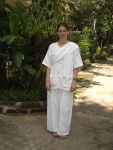 have the very un-Buddhist-like urge to wipe that look of serenity off
her face by any means necessary. One day Prah Guy yells at Gage and me
for chatting and makes him sit apart from me. One of the Pros learns
over to me and says she knows how I feel because her husband is there
too, but whenever she walks into a room where he is, she just keeps her
distance and observes her feelings. I tell her that’s great, but I’m
pretty miserable here and I’m looking for comfort. She recommends that I
observe how I cope without him. Prah Guy-hole then yells at us for
chatting before I have the chance to thank the Bodhisatva for her advice
and give her my address to get a subscription to her mental masochist
newsletter.
have the very un-Buddhist-like urge to wipe that look of serenity off
her face by any means necessary. One day Prah Guy yells at Gage and me
for chatting and makes him sit apart from me. One of the Pros learns
over to me and says she knows how I feel because her husband is there
too, but whenever she walks into a room where he is, she just keeps her
distance and observes her feelings. I tell her that’s great, but I’m
pretty miserable here and I’m looking for comfort. She recommends that I
observe how I cope without him. Prah Guy-hole then yells at us for
chatting before I have the chance to thank the Bodhisatva for her advice
and give her my address to get a subscription to her mental masochist
newsletter.
It was day 13 of our 26 day stay that we went to Prah Adjarn and requested to leave early. There were many times that we thought we could make it, but once we started sleeping we couldn’t stop, and we knew that if he upped the hours any more, we’d have to start lying about what we had done. Lying by omission was tough enough, but lying outright was not something that Prah Adjarn deserved. After all, if Wat Rampoeng is kind enough to let anyone stay with them and only ask for a donation in return, the least a person can do is follow their rules, no matter how stringent. After logging almost 100 hours of meditation, we asked to leave. Medji Pon Piit understood and said that the 26 day course was very hard. Prah Adjarn was disappointed and that hurt, but we still felt like we were doing the right thing. As we explained to them, our hearts we no longer in it and we were wasting their valuable time which could be spent on more committed students.
We said our goodbyes to all of our new friends, cleaned our rooms and packed our stuff. As we sat in the courtyard the morning that we were leaving, Prah Guy came over and sat and talked with us. He told us that he had been there 15 years. That he first came to study for a month. That for the first 18 days he hated meditation and wanted to leave. Two months later he was a monk. He said that he had a lot of work to do, taking care of the foreigners and watching over the gardens. He was overworked, but he said that he couldn’t complain because the Abbot works so much harder. He knows that he’s very strict with students, but he also knows that being strict in the beginning makes it easier as time goes by. He believes in the power of meditation to heal people and to relieve suffering. He cousels his father who is still lonely after his mother passed away. When he has time off of the monastery he works to help support his father. He said that he hopes Obama meditates. He says that some day he may find a wife and he will tell her that he is not handsome and not rich, but a good man because he meditates. Through meditation he can understand people. That he’ll understand his wife and his child and that he understands why Gage and I were leaving early.
It’s obvious to me now that I fought against, not through, my time at the Northern Insight Meditation Center. Either this was the wrong program for me or I was not ready for it. But we do not regret the time that we spent there. We learned a lot about the religion of Buddhism and about the Thai culture, though we had to learn it all through observation as nothing is explained when you can’t talk and everything is in Thai. We also got to live this culture, which is pretty extraordinary. We came away with strong backs and more focused minds. We also learned that everyone’s meditation experience is very different. Often times we would look at someone sitting serenely on a meditation pad and think, yeah it’s easy for you, only to talk to that person later and find out that they are distracted and miserable. Others like our friends Lai and Simon loved the practice more and more as days passed. Lai even extended his stay from 10 days to 26 and may stay longer. One guy named Sebastian would giggle uncontrollably the entire time he was in sitting meditation. It was a comfort to find that our experience was not definitive, that there was hope for us yet. The night after we left and the morning we woke, Gage and I both meditated for an hour. I now know more than ever that meditation can clear the mind, help me to live in the moment, and to focus. Maybe years down the line I can get the place Prah Guy is in, where I can understand people and where I can know that I am a good person. For the meantime we’ll take our strong backs and continue wrestling with our impatient minds.
For more pictures from Wat Rampoeng, click here.
Advice:
– Invent a knee or back condition. It’s the only way they take your pain seriously. I told them I was in pain and I got ‘friend eyes’. Gage said he was in pain and he was told to sit in a chair. That being said, don’t be a pansy about the pain. It actually keeps your mind from wandering.
– No one is watching so try a million different positions until you find one that you can hold.
– If you have knee pain they often give you a stool. Gage said this places all the weight on your ankles. It’s better to put pads under your knees and sit on the floor.
– If you have knee or ankle conditions, bring a brace or ace bandage. The balancing you do during walking meditation can produce major joint inflammation.
– Work on your core strength before you come.
– In order not to break the eating rule, you can buy some delicious soy milks and plain yogurt for about 13 Baht each at the store outside of the dining hall. Also, don’t miss the 5pm drinks outside the dining hall. They are usually made from pumpkin, squash, fruit, or soy, are deliciously filling and free.
– The dining hall always has two lines, the vegetarian food and the ‘normal food’ line. Warning: the Thai people think that large chunks of fat = meat, so check out the meat before deciding. One breakfast was a soup of noodles and pork rinds, while the vegetarians got noodles and hard boiled eggs. Who said Asian food is healthy?
– Stop talking as soon as you get there. The more hard core you are in the beginning, the easier it will be as time goes by. Also, keep in mind talking screws up other people’s meditation practice. Gage and I were a terrible influence.
– Clean your room on the first day. You will never have time to do it again.
– Unless you both happen to be meditation gurus, don’t go to Wat Rampoeng as a couple. It’s impossible to separate from each other when you see each other all day.
– Try not to think about the future, because thinking of the 11 hours of meditation you have to do can be daunting. Thinking of how you have to do 12 hours of meditation every day for weeks can make you want to quit. As Prah Guy says, don’t think, do.
– Get an extra blanket. You can use it to prop up your knees or sit on.
– Lay on a pillow to stretch your back backwards. The back pain you will feel by day six is horrendous. Don’t worry, it really does go away.
– Know something about Vipassana meditation and Thervada Buddhism before you come because nothing is explained, everything is in Thai, and it is very very confusing.
– Cockroaches love to eat organic matter, which means your hair, dead skin cells, dead bugs, etc. Sweep your room every day.
– Don’t worry about forgetting stuff. The shop in the center of the wat is open most of the day and has tons of stuff besides food like socks, white clothes, deoderant, soap, medications, batteries, phone cards, etc. as well as an amazing selection of yummy 5 baht snacks.
– You pay to have your clothes laundered. It is 8 baht per item, 15 baht for two items and 20 baht for blankets and sheets.
– You can rent your clothes from the wat for 150 baht per set (includes scarf for the ladies).
– It can get really cold starting in November and going through January. Considering they have no hot water at the entire wat, you may want to visit during the hot season if you have a problem with freezing cold showers.
– While they would prefer you stay for 26 days, if you’re at all unsure about whether or not you can pull this off, just sign up for 10 days and tell them you want to stay longer if things are going well. They don’t really take reservations, so staying longer is usually fine.
– You can’t make reservations by email, though you can ask questions. The best way to make plans is to call or visit a week or so ahead of time. You can start any day, except Buddha Days, so check the calendar.
Things to Bring:
Extra towel or bathmat
Tea and/or instant coffee
Lots of small change for the store and laundry
Sealable baggies to keep bugs away from your snacks and tea/coffee
Lot of bug spray
Medications and echinacea
Knee/ankle braces if you use them
Alarm clock (although men don’t really need this because the morning bell is right outside your window and is REALLY loud)
A Timer (you can also buy one at the front office for 400 baht)
Meditation props (if you look like a pro, people will treat you like one)
About a year and half ago I came across a website for the Northern Insight Meditation Center in Chiang Mai, Thailand. Having dabbled in martial arts and meditation courses in the past, I was intrigued by the opportunity to take my practice even further and get the benefits I had seen in more dedicated meditators. While other wats like Suan Dok advertised three day courses, the Wat Rampoeng offered a 26 day beginner course. For extremists like myself, this seemed like the best (if not only) option. The course looked difficult; rising at 4am, breakfast at 6am, lunch at 10:30am, no food after noon, no talking except during your report to the teacher once per day, and then to bed at 10pm. In between those times, you meditate on your own. I was intrigued, Gage was wary, and a year and a half later, we were walking through the front gates with packed bags, big smiles, a lot of optimism, and no idea of what we were getting ourselves into. This is how it all went down.
All foreign meditators have one large hurdle to overcome when they first arrive and that is Prah Guy Budiin. He’s the first person we meet upon arrival since he heads up the foreign meditator office, and we find that most people either love him or hate him or both. Completely destroying the stereotype of the quiet, dignified, old monk, Prah Guy usually walks into the office still putting his robes on, muttering to himself, completely frazzled by the loads of stuff he has to do (he also is charged with keeping green the numerous gardens at the Wat), and attempting to speak a mile a minute in broken English to a bunch of people who are inevitably totally ignorant of how to act or what to do. Gage and I join a group of four other girls who have just arrived and work very hard at doing everything Prah Guy barks at us for fear of irritating him. He takes us on a tour of the Wat, which covers a pretty large area, and starts vacillating between being grating our nerves and endearing himself to us. One minute he’s chastising the girls for not putting their scarves on correctly and the next minute he’s showing us the cleaning supplies for our room and telling us softly to “be careful don’t touch your eye. Strong chemical” like he’s our mom. The fact that he’s 41 years old but looks like he’s about 29 adds to the Dr. Jekyll and Mr. Hyde effect. With the attitude of a grumpy old man and the face of a sweet little boy it’s hard to figure out how to take him. Of course we’re all so excited to be there and so optimistic about the promised enlightenment in our future that we happily fall in line.
Meditation practice starts immediately. Prah Guy slowly and methodically teaches us the steps for the meditation warm-up, say “Just like tennis player, meditator need warm-up too.” It’s essentially a broken down version of the typical bow the Thai people do to pay homage, so the practice has the two fold effect of teaching us the warm-up and committing the proper Buddha greeting to muscle memory. After that we practice the walking meditation steps, which kind of makes us look like well-coordinated and incredibly inactive zombies. Finally we cram in a couple sitting meditations in which we watch the rising and falling of our abdomen and fight to keep our mind from thinking of anything else and our legs from falling asleep. It’s fast, intense, and serves to raise the nerves of everyone in the room. Heck, one girl was crying within the first few hours of arriving and I assured her that we all felt pretty much the same way. While I knew we weren’t supposed to be talking, I couldn’t help my natural tendency to elevate the moods of everyone in the room. Showing the lack of self-control I came to Wat Rampoeng to gain back, I threw in sarcastic and witty comments whenever I could just to elicit some smiles. Like the time when Prah Guy asked one meditator, Pauline, how she felt and she said ‘stressed’ and he turned to me and said, “What stressed?” and I said “It’s you.”
The stress only grows as we are herded into the waiting room of Prah Adjarn Suphon’s office, the Abbot of Wat Rampoeng and our teacher for the meditation course. After a very quick run down of what we’re expected to do upon entrance and exit of his office, we feel very ill-equipped to face the big man and we whisper to each other trying to remember our lines and actions, while being intermittently shushed by Prah Guy. I suddenly feel myself having loads of sympathy for kindergarteners the world over. When we finally enter the office of the Abbot on our knees (no one walks in for fear of letting their head go above his) we are greeted by the warm smiles of Prah Adjarn and Medji Pon Piit, his translator. As the days go by I learn that the Abbot speaks English pretty well, but occasionally needs help from a translator. It’s a wonder that he ever learned to speak English at all considering his day is comprised of 4am chants, breakfast, meetings with staff, lunch, meetings with the monks, meetings with the foreigners, and any ceremonies he can fit in between before he shuts his office doors at 9pm. Despite his seriously incongruous work/life balance, he smiles at everyone who comes through his door.
Prah Adjarn speaks words to us that we don’t understand, which he knows will later become clear in many many aha! moments. We are given the prescription of 15 minutes walking meditation followed by 15 minutes sitting meditation for a total of six hours. It’s a tall order, but we’re all too concentrated on proper bowing technique to really think about it. Once we’re out of there and heading back to the dorms we do swift calculations and start to whisper to each other. Prah Guy tells us the next day that the Abbot had to leave and will be back the next day and that in the meantime we should be aiming for more along the lines of eight hours. As if watching Gage walk off to his room with a whispered I love you and the knowledge that I have to wrestle with a very talkative mind for the next eight hours weren’t bad enough, I quickly find that meditation is an extremely painful activity. I’ve meditated for 15 minutes before and it’s never been that bad, but it turns out that the ligaments, tendons and muscles of my knees have a calculator and despite the 15 minute sessions, they are all too aware that at the end of the day, I’m pulling in four hours of knee twisting and they start to let me know loud and clear that it’s not OK.
The next time I see Prah Adjarn I tell him that the pain is excruciating and that I’m having trouble walking and I ask what I should do. He tells me “Pain is your friend and will visit you often in your life.” Fair enough, no one can escape pain completely without a thick prescription pad and a serious chemical content. Medji Pon Piit then tells me to look at the pain with “friend eyes” and meditate with the pain, accepting it as part of my body. This is one of those Aha! moments when I remember Prah Adjarn telling us in the opening ceremony that Vipassana meditation was introduced by Buddha as a way to escape suffering. Prah Adjarn also said that in order to learn to deal with suffering, we had to suffer a bit ourselves. Makes sense; the best way to learn to deal with something is to face it head on. So we sleep less, we eat less, we talk less, etc. Of course this basically means that Prah Adjarn and all of the other monks running around this joint are a bunch of pint-sized, saffron-robed masochists. What? You’re in terrible pain and can barely move? Nice work, continue. Oh you’re sick and the mucous in your head gives you vertigo? Extra suffering points for you, my friend, continue. I actually got sick during the first week and told them that I was earning extra suffering points and they literally smiled and nodded.
During one of our many whispered meetings in the cover of darkness, Gage and I reflected on how we wanted the meditation retreat to be at the end of our trip so that we could enter the real world fresh and ready to go. We laughed, now knowing how insanely stressful the whole experience was becoming, and this was only day three. You see, every time you meet with the teacher he gives you a new step or instruction, as well as an extra five minutes on your meditation sessions and increase in total hours. In no time, you’re logging 30 minute sessions for a total of ten hours a day. And besides the stress of cramming in all of those hours to the detriment of your knees, hips and spine, we have the guilt of breaking the rules. Everyone tries very hard to be perfect in the beginning, but then out of pure instinct you kill a mosquito. Or maybe you fall asleep during your meditation, which you just happen to be doing on your bed. I started to tell myself that I was simply petting the mosquitoes and forgetting my own strength, or kindly bathing some of the bugs in my bathroom, not knowing that they couldn’t swim. Eventually I felt bad about it and, unable to say anything to the saintly Prah Adjarn, I whisper to my friend Anna “I took a nap today. I just couldn’t take it anymore,” and she replies “I slept through breakfast” and suddenly I feel so much better.
It was the sleeping and the sickness that was my eventual downfall. I thought it might be not talking to Gage, but despite our best efforts, we saw each other all the time and we always talked. In fact it was surprising to see how many people talk. Tons of the Thai students would sit around after breakfast, chatting quietly to one another even though everyone was under the same rules. Unless you have an iron will, it’s hard not to look around and say, well if they can do it…. So we talked every day. After two days of battling with the ‘medication through meditation’ suggested by Medji Pon Piit, I started to just get fed up. The fact of the matter is that I value sleep. Actually I revere sleep. I read this life-changing book called The Promise of Sleep and learned more about the value of sleep than I even thought existed. And if there’s one thing I knew for certain it was that sleep is an amazing cure all. I started to reason with myself. I noted that Prah Guy Budiin had been sick for many days now, and seemed to be getting worse, not better. I thought about how the Abbot had fallen asleep twice while I was in reporting. Pauline said he had fallen asleep on her too. That was all the proof I needed that I was right, and I needed to get to sleep. So for the first time in my life, I felt like a rebel because I went to bed at 8pm. The next morning, I felt much better. Three naps later, I was the picture of health. Not only did I feel healthy, I felt justified and self-righteous. As you can imagine, this did not bode well for the future of my humble meditation practice. It was only day six.
When I next saw Gage, he looked deflated. As anyone who knows him can tell you, Gage has serious sleep issues. The man can sleep forever and he does not function well on less than eight hours of sleep. Combine that with the debilitating knee pain he was feeling due to the inflexibility of his ankles and his knee surgery and he was miserable. I sat down next to him and said, “Sleep. I just slept for a total of about 11 hours and I feel wonderful. Sleep. Screw the rules or you’ll never make it.” And that’s how I killed Gage’s meditation experience. I also told him to make himself really comfortable. One day, while doing walking meditation in the library, I saw a lady with pads under her knees and another lady with her back against a wall. They were older ladies and I’m sure they had various conditions that necessitated these props. In fact Gage had been given a little six inch stool due to his knee surgery. It suddenly occurred to me that, in spite of being comfortable, these ladies had just as much of a chance of reaching nirvana as anyone else, so why the heck was I crying during sitting meditation? That’s when I started padding my knees and sitting against a wall. Don’t worry, I was still in pain. You try sitting completely still for 30 minutes with crossed legs in a straight back chair and tell me how you feel.
Before deciding to sleep I had some pretty wonderful meditation sessions in which I felt funny tingly feelings, saw pretty colors, and even felt as though I could slip inside my own body. Gage had these type of mediations as well. Meditation practice is like a roller coaster; the good follows the bad follows the good follows the bad. We looked forward to more trippy experiences, as we heard the reports of other people who were further into the meditation practice having visions and feeling incredible things. However, once we started sleeping, it all went away. It wasn’t noticeable at first, it just felt like an uneventful meditation day. But those days carried on and the funny feelings never returned. I remembered the chapter in The Promise of Sleep when he talks about the link between sleep deprivation and people who reported being abducted by aliens. I also remembered going on a Christian retreat with a friend in sixth grade in which several hundred people went to a night hockey game, followed by hitting up a midnight roller rink, then going to a bowling alley at 3am, and finally being dropped off at dawn at the church. All along the way there were talks of Jesus and people having deep religious experiences. The last three days of a 26 day meditation course at Wat Rampoeng are supposed to end with Determination, which is where you stay in your room for 72 hours and meditate 24 hours a day. There seemed to be a connection between sleep deprivation intense extrasensory experiences. Maybe it helps you loosen your mind so that you can experience the reality that is beyond our logical, everyday existence. I don’t know. All I know is that we had decided to sleep and so we resigned ourselves to a meditation practice that focused on concentration and mental-control, not on feelings.
While I enjoyed being well rested and having much more manageable pain, I felt guilty about the rule breaking. I was sleeping more than six hours, talking, and killing mosquitoes. Perhaps I was going to Buddhist hell for all of this. Of course, I was pretty sure I was in Buddhist hell. If the road to nirvana was paved with starvation, sleep deprivation, and painful body manipulations, how much worse could it be? It was as if the Christian missionaries came to Thailand and told the people about hell and the Buddhists started taking notes. Perhaps I should have tried to make merit by giving food to the monks. Making merit is how the Buddhists atone for their sins. Funny how religions can be so similar even when their so different. ‘Your version of heaven sounds great. How do I get into it?’ ‘Well, you make merit.’ ‘How do I do that?’ ‘Uh, well, you give me stuff.’ Brilliant.
Not everyone breaks the rules with such reckless abandon. There are plenty of people who show up there and know what the heck they are doing. We referred to these people as The Pros. The Pros are
 obnoxious.
They come in with their own special-decial meditation pads and their
stylin’ white clothes that look like they’ve stepped out of the pages of
a GAP Yoga catalogue, while you’re standing there in mismatched
hand-me-down rags that are six sizes to big and make you looks like a
human diaper. You try not to hate these people and just accept that they
are smarter than you are and signed up for a meditation camp because
they actually meditate. But one day you’re sitting in the library in
inexorable agony and you look up to see some girl with perfect clothes
and perfect posture sitting on her little pink meditation pillow and you
obnoxious.
They come in with their own special-decial meditation pads and their
stylin’ white clothes that look like they’ve stepped out of the pages of
a GAP Yoga catalogue, while you’re standing there in mismatched
hand-me-down rags that are six sizes to big and make you looks like a
human diaper. You try not to hate these people and just accept that they
are smarter than you are and signed up for a meditation camp because
they actually meditate. But one day you’re sitting in the library in
inexorable agony and you look up to see some girl with perfect clothes
and perfect posture sitting on her little pink meditation pillow and you have the very un-Buddhist-like urge to wipe that look of serenity off
her face by any means necessary. One day Prah Guy yells at Gage and me
for chatting and makes him sit apart from me. One of the Pros learns
over to me and says she knows how I feel because her husband is there
too, but whenever she walks into a room where he is, she just keeps her
distance and observes her feelings. I tell her that’s great, but I’m
pretty miserable here and I’m looking for comfort. She recommends that I
observe how I cope without him. Prah Guy-hole then yells at us for
chatting before I have the chance to thank the Bodhisatva for her advice
and give her my address to get a subscription to her mental masochist
newsletter.
have the very un-Buddhist-like urge to wipe that look of serenity off
her face by any means necessary. One day Prah Guy yells at Gage and me
for chatting and makes him sit apart from me. One of the Pros learns
over to me and says she knows how I feel because her husband is there
too, but whenever she walks into a room where he is, she just keeps her
distance and observes her feelings. I tell her that’s great, but I’m
pretty miserable here and I’m looking for comfort. She recommends that I
observe how I cope without him. Prah Guy-hole then yells at us for
chatting before I have the chance to thank the Bodhisatva for her advice
and give her my address to get a subscription to her mental masochist
newsletter.It was day 13 of our 26 day stay that we went to Prah Adjarn and requested to leave early. There were many times that we thought we could make it, but once we started sleeping we couldn’t stop, and we knew that if he upped the hours any more, we’d have to start lying about what we had done. Lying by omission was tough enough, but lying outright was not something that Prah Adjarn deserved. After all, if Wat Rampoeng is kind enough to let anyone stay with them and only ask for a donation in return, the least a person can do is follow their rules, no matter how stringent. After logging almost 100 hours of meditation, we asked to leave. Medji Pon Piit understood and said that the 26 day course was very hard. Prah Adjarn was disappointed and that hurt, but we still felt like we were doing the right thing. As we explained to them, our hearts we no longer in it and we were wasting their valuable time which could be spent on more committed students.
We said our goodbyes to all of our new friends, cleaned our rooms and packed our stuff. As we sat in the courtyard the morning that we were leaving, Prah Guy came over and sat and talked with us. He told us that he had been there 15 years. That he first came to study for a month. That for the first 18 days he hated meditation and wanted to leave. Two months later he was a monk. He said that he had a lot of work to do, taking care of the foreigners and watching over the gardens. He was overworked, but he said that he couldn’t complain because the Abbot works so much harder. He knows that he’s very strict with students, but he also knows that being strict in the beginning makes it easier as time goes by. He believes in the power of meditation to heal people and to relieve suffering. He cousels his father who is still lonely after his mother passed away. When he has time off of the monastery he works to help support his father. He said that he hopes Obama meditates. He says that some day he may find a wife and he will tell her that he is not handsome and not rich, but a good man because he meditates. Through meditation he can understand people. That he’ll understand his wife and his child and that he understands why Gage and I were leaving early.
It’s obvious to me now that I fought against, not through, my time at the Northern Insight Meditation Center. Either this was the wrong program for me or I was not ready for it. But we do not regret the time that we spent there. We learned a lot about the religion of Buddhism and about the Thai culture, though we had to learn it all through observation as nothing is explained when you can’t talk and everything is in Thai. We also got to live this culture, which is pretty extraordinary. We came away with strong backs and more focused minds. We also learned that everyone’s meditation experience is very different. Often times we would look at someone sitting serenely on a meditation pad and think, yeah it’s easy for you, only to talk to that person later and find out that they are distracted and miserable. Others like our friends Lai and Simon loved the practice more and more as days passed. Lai even extended his stay from 10 days to 26 and may stay longer. One guy named Sebastian would giggle uncontrollably the entire time he was in sitting meditation. It was a comfort to find that our experience was not definitive, that there was hope for us yet. The night after we left and the morning we woke, Gage and I both meditated for an hour. I now know more than ever that meditation can clear the mind, help me to live in the moment, and to focus. Maybe years down the line I can get the place Prah Guy is in, where I can understand people and where I can know that I am a good person. For the meantime we’ll take our strong backs and continue wrestling with our impatient minds.
For more pictures from Wat Rampoeng, click here.
Advice:
– Invent a knee or back condition. It’s the only way they take your pain seriously. I told them I was in pain and I got ‘friend eyes’. Gage said he was in pain and he was told to sit in a chair. That being said, don’t be a pansy about the pain. It actually keeps your mind from wandering.
– No one is watching so try a million different positions until you find one that you can hold.
– If you have knee pain they often give you a stool. Gage said this places all the weight on your ankles. It’s better to put pads under your knees and sit on the floor.
– If you have knee or ankle conditions, bring a brace or ace bandage. The balancing you do during walking meditation can produce major joint inflammation.
– Work on your core strength before you come.
– In order not to break the eating rule, you can buy some delicious soy milks and plain yogurt for about 13 Baht each at the store outside of the dining hall. Also, don’t miss the 5pm drinks outside the dining hall. They are usually made from pumpkin, squash, fruit, or soy, are deliciously filling and free.
– The dining hall always has two lines, the vegetarian food and the ‘normal food’ line. Warning: the Thai people think that large chunks of fat = meat, so check out the meat before deciding. One breakfast was a soup of noodles and pork rinds, while the vegetarians got noodles and hard boiled eggs. Who said Asian food is healthy?
– Stop talking as soon as you get there. The more hard core you are in the beginning, the easier it will be as time goes by. Also, keep in mind talking screws up other people’s meditation practice. Gage and I were a terrible influence.
– Clean your room on the first day. You will never have time to do it again.
– Unless you both happen to be meditation gurus, don’t go to Wat Rampoeng as a couple. It’s impossible to separate from each other when you see each other all day.
– Try not to think about the future, because thinking of the 11 hours of meditation you have to do can be daunting. Thinking of how you have to do 12 hours of meditation every day for weeks can make you want to quit. As Prah Guy says, don’t think, do.
– Get an extra blanket. You can use it to prop up your knees or sit on.
– Lay on a pillow to stretch your back backwards. The back pain you will feel by day six is horrendous. Don’t worry, it really does go away.
– Know something about Vipassana meditation and Thervada Buddhism before you come because nothing is explained, everything is in Thai, and it is very very confusing.
– Cockroaches love to eat organic matter, which means your hair, dead skin cells, dead bugs, etc. Sweep your room every day.
– Don’t worry about forgetting stuff. The shop in the center of the wat is open most of the day and has tons of stuff besides food like socks, white clothes, deoderant, soap, medications, batteries, phone cards, etc. as well as an amazing selection of yummy 5 baht snacks.
– You pay to have your clothes laundered. It is 8 baht per item, 15 baht for two items and 20 baht for blankets and sheets.
– You can rent your clothes from the wat for 150 baht per set (includes scarf for the ladies).
– It can get really cold starting in November and going through January. Considering they have no hot water at the entire wat, you may want to visit during the hot season if you have a problem with freezing cold showers.
– While they would prefer you stay for 26 days, if you’re at all unsure about whether or not you can pull this off, just sign up for 10 days and tell them you want to stay longer if things are going well. They don’t really take reservations, so staying longer is usually fine.
– You can’t make reservations by email, though you can ask questions. The best way to make plans is to call or visit a week or so ahead of time. You can start any day, except Buddha Days, so check the calendar.
Things to Bring:
Extra towel or bathmat
Tea and/or instant coffee
Lots of small change for the store and laundry
Sealable baggies to keep bugs away from your snacks and tea/coffee
Lot of bug spray
Medications and echinacea
Knee/ankle braces if you use them
Alarm clock (although men don’t really need this because the morning bell is right outside your window and is REALLY loud)
A Timer (you can also buy one at the front office for 400 baht)
Meditation props (if you look like a pro, people will treat you like one)
Advertisements
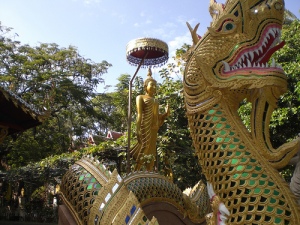
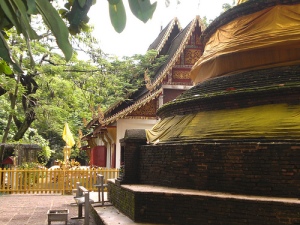
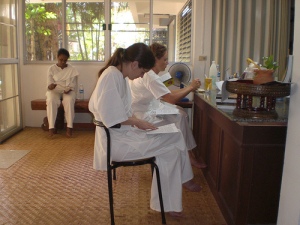


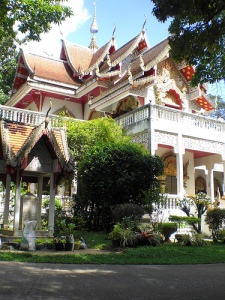
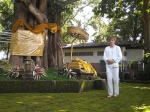

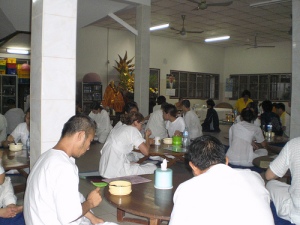
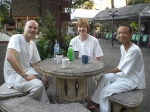
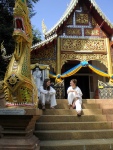
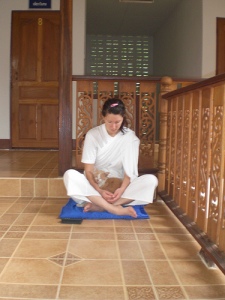
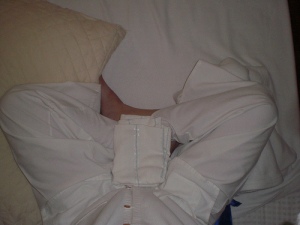
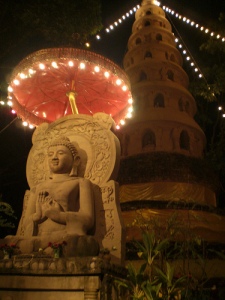
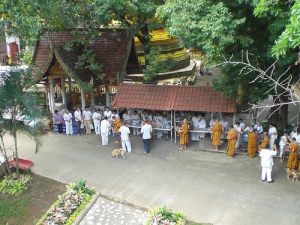
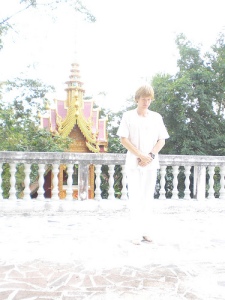
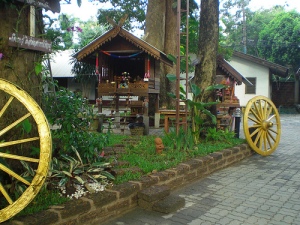
No comments:
Post a Comment